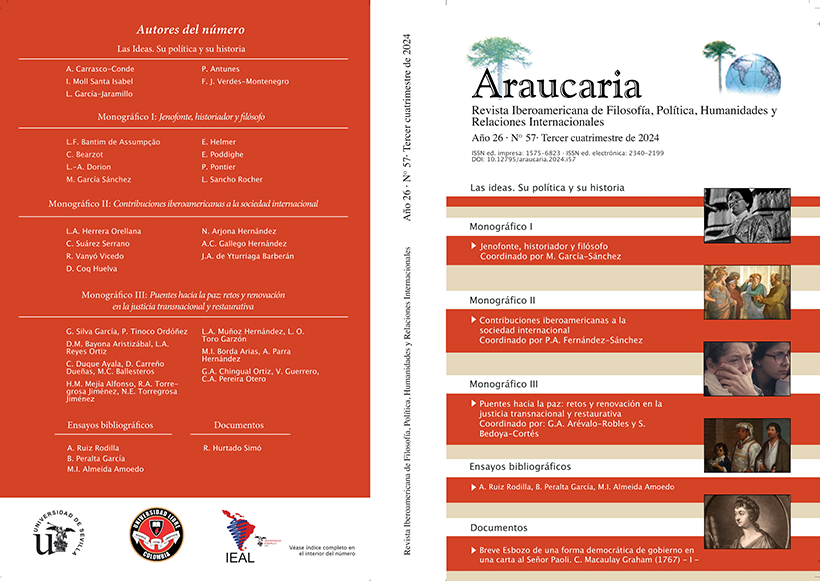Did Socrates intend to commit suicide? A rereading of the defense of Socrates in Xenophon's Apology
¿Tenía Sócrates la intención de suicidarse? Una relectura de la defensa de Sócrates en la Apología de Jenofonte
DOI:
https://doi.org/10.12795/araucaria.2024.i57.09Palavras-chave:
Xenophon, Socrates, Apology of Socrates, Memorabilia, suicide, megalêgoria, trialResumo
In recent years, several commentators have argued that Socrates, at the time of his trial, intended to die, and that he therefore used megalêgoria ("boasting") to provoke his judges into condemning him to death. Contrary to this reading of the Apology, I shall endeavor to show that Socrates actually defends himself during his trial, and that the intention behind his choice of megalêgoria is not to provoke his judges into condemning him to death.
Downloads
Referências
Azoulay, V. 2004: Xénophon et les grâces du pouvoir. De la charis au charisme, Paris, Publications de la Sobornne.
Bandini, M. & Dorion, L.-A. 2000: Xénophon: Mémorables, vol. I : Introduction, Livre I, Paris, Les Belles Lettres.
Bandini, M. & Dorion, L.-A. 2011: Xénophon: Mémorables, vol. II-2 : Livre IV, Paris, Les Belles Lettres.
Brickhouse, T. C. & Smith, N. D. 1989: Socrates on Trial, Oxford, Oxford U.P.
Chambry, P. 1935: Xénophon: Helléniques, Apologie, Mémorables, Paris, Garnier.
Danzig, G. 2010: Apologizing for Socrates. How Plato and Xenophon created our Socrates, Lanham, , MD, Lexington Books.
-2014: “The best way to die: wisdom, boasting and strenght of spirit in Xenophon’s Apology”, Classica et Mediaevalia, 65 (2014), 155-189.
Dorion, L.-A. 2005: “The daimonion and the megalêgoria of Socrates in Xenophon’s Apology”, in P. Destrée & Nicolas D. Smith (eds.), Socrates’ divine sign: religion, practice, and value in Socratic philosophy, (= Apeiron 38 (2005) n°2), 127-142.
-2018: “Fundamental parallels between Socrates’ and Ischomachus’ positions in the Oeconomicus”, in C. Moore & A. Stavru (eds.), Socrates and the Socratic dialogue, Leiden, Brill, 521-543.
Duff, R. A. 1983: “Socratic suicide”, Proceedings of the Aristotelian Society, 83 (1983), 35-47.
Hammond, M. 2023: Xenophon: Memories of Socrates (Memorabilia and Apology), Oxford World’s Classics, Oxford, Oxford U.P.
Johnson, D. 2017: “Xenophon’s Apology and Memorabilia”, in M.A. Flower (ed.), The Cambridge companion to Xenophon, Cambridge, Cambridge U.P., 119-131.
Johnson, D. 2021: Xenophon’s Socratic works, London, Taylor & Francis.
Konstan, D. 1987: Xenophon’s Apology of Socrates, Bryn Mawr Greek Commentaries.
Lacey, A. R. 1971: “Our knowledge of Socrates”, in G. Vlastos (ed.), The philosophy of Socrates. A collection of critical essays, Garden Cit, Anchor Books, 22-49.
Marchant, E. C. 2013: Xenophon: Memorabilia & Oeconomicus [1923], revised by Jeffrey Henderson, (Loeb classical library, 168), Cambridge, Cambridge U.P.
Ollier, F. 1961: Xénophon: Banquet, Apologie de Socrate, Paris, Belles Lettres.
Peterman, J. E. 1984: J.E. “The Socratic suicide”, in E. Kelly (ed.), New essays on Socrates, (Lanham, MD, University Press of America, 3-15.
Pontier, P. 2015: “Remarques sur la megalègoria de Socrate et le tumulte des juges”, Kentron, 31 (2015), 59-74.
-2018: “How to defend the defense of Socrates? From the Apology to Memorabilia Book I”, in A. Stavru & C. Moore (eds.), Socrates and the Socratic dialogue, Leiden, Brill, 435-458.
Pucci, P. 2002: Xenophon: Socrates’ defense, Amsterdam, Adolf M. Hakkert.
Shero, L. R. 1927: “Plato’s Apology and Xenophon’s Apology”, The Classical Weekly, 20,107-111.
Vlastos, G. 1991: Socrates. Ironist and moral philosopher, Cornell, Cornell U.P.
Warren, J. 2001: J. “Socratic suicide”, Journal of Hellenic Studies, 121, 91-106.
Waterfield, R. 1990: Xenophon: Conversations of Socrates (Socrates’ Defence, Memoirs of Socrates, The Dinner-Party, The Estate-Manager), London, Penguin.
-2012: “Xenophon on Socrates trial and death”, in F. Hobden & C. Tuplin (eds.), Xenophon: Ethical principles and historical enquiry, Leiden, Brill, 269-306.
Downloads
Publicado
Como Citar
Edição
Seção
Licença
Las ediciones impresa y electrónica de esta Revista son editadas por el Secretariado de Publicaciones de la Universidad de Sevilla, siendo necesario citar la procedencia en cualquier reproducción parcial o total.Salvo indicación contraria, todos los contenidos de la edición electrónica se distribuyen bajo una licencia de uso y distribución “Creative Commons Atribución-NoComercial-SinDerivar 4.0 Internacional”








